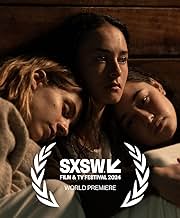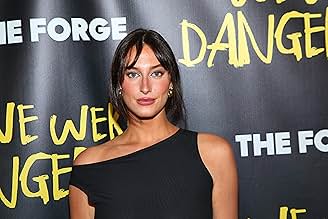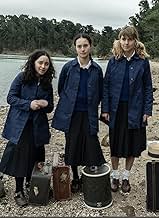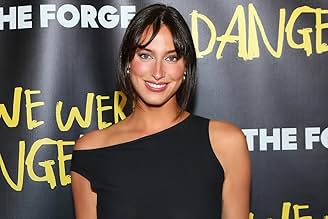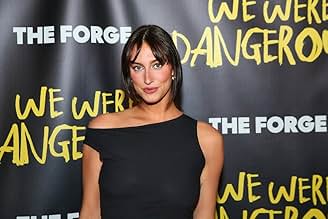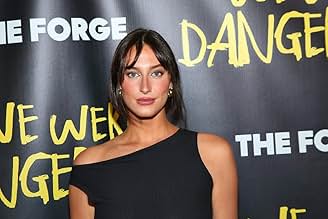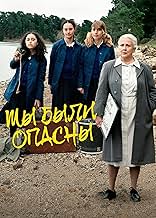Nellie, Daisy and Lou attend an institution for delinquent girls on an isolated island in 1954. The trio rail against the system, finding strength in their friendship but this is challenged ... Read allNellie, Daisy and Lou attend an institution for delinquent girls on an isolated island in 1954. The trio rail against the system, finding strength in their friendship but this is challenged when the school's matron divides them.Nellie, Daisy and Lou attend an institution for delinquent girls on an isolated island in 1954. The trio rail against the system, finding strength in their friendship but this is challenged when the school's matron divides them.
- Director
- Writers
- Stars
- Awards
- 3 wins & 2 nominations total
- Director
- Writers
- All cast & crew
- Production, box office & more at IMDbPro
Featured reviews
The movie is sensible, mature and powerful. The friendship between the girls is maybe one of the best part of the movie. All the actress are amazing on this, especially Erana James with some of the most strong scenes (although the chemistry between the three of them is what is most beautiful about it). The final scene is my favourite one with a incredible soundtrack. The director did such a great job and choices for this movie. About the story, it's sad, funny sometimes, touching and very realistic. The hope of a escape for the girls is what made me more excited for, knowing that the strength of the movie consist in how the girls found hope on each other.
A well made kiwi film doing what well made kiwi films do, tell a story well.
The cast are excellent with Rima Te Wiata a standout as matron, and a step away from her role in 'The hunt for the wilder people'.
The story is a simple one, without intrigue, car chases or CGI of more modern tales. Without giving the plot away it portrays the late 50's attitudes to the coming storm of the sixties well. Young women unprepared for a more modern life but plunging into anyway, and gaining the sigma of being a 'delinquent'. An older generation struggling to come to terms with this and clutching at the values of church, wedded bliss, government and stern teaching like a drowning man would clutch at a straw.
This film won't shatter you, nor test your sensibilities but if will give you a view through the window to a time it's hard to believe was just over half a century ago. How we've progressed?
The cast are excellent with Rima Te Wiata a standout as matron, and a step away from her role in 'The hunt for the wilder people'.
The story is a simple one, without intrigue, car chases or CGI of more modern tales. Without giving the plot away it portrays the late 50's attitudes to the coming storm of the sixties well. Young women unprepared for a more modern life but plunging into anyway, and gaining the sigma of being a 'delinquent'. An older generation struggling to come to terms with this and clutching at the values of church, wedded bliss, government and stern teaching like a drowning man would clutch at a straw.
This film won't shatter you, nor test your sensibilities but if will give you a view through the window to a time it's hard to believe was just over half a century ago. How we've progressed?
Kia ora. This is an excellent wee New Zealnd film, with great characters. Matron has a Nurse Ratched vibe, and all the cast felt authentic. So often teenagers are written as caricatures, but these girls felt like real people. I look forward to more from these film makers. I'm local enough that family of the cast were at the screening, made it a real Kiwi event!
As far as I know these events are fictional, but the plot was very believable. 1950's ideas about ideal members of society, how best to conform and knowing your place are uncomfortable. Thank the gods these attitudes are a thing of the past.
As far as I know these events are fictional, but the plot was very believable. 1950's ideas about ideal members of society, how best to conform and knowing your place are uncomfortable. Thank the gods these attitudes are a thing of the past.
No matter what anyone might suggest to the contrary, generally speaking, girls will be girls, especially during those often-turbulent, rebellious adolescent years. What's more, attempts at implementing "correction" are frequently frustrating and unsuccessful for those undertaking such efforts, an outcome that was usually just as true in the past as it is today. Such was the case in 1954 New Zealand, where a dozen social and sexual "deviants" were confined at the government-sponsored Te Motu School for Incorrigible and Delinquent Girls. The facility, located on a remote island that was once a leper colony and home to assorted misfits and undesirables, was established out of the alleged genuine concern of the state to help rehabilitate the behavior of young women gone astray with the aim of helping to transform them into proper ladies suitable for marriage and motherhood. This was accomplished by strictly following a three-step program of "Christianize, civilize and assimilate" (with particularly heavy emphasis on the first step). Narrated by the school's stern, calculating, insincere head matron (Rima Te Wiata), the film chronicles the diverse life experiences and backgrounds of her girls, many of which are presented anecdotally and in flashbacks. Some of these incidents are wryly humorous (though quaintly archaic), while others are sad, tragic and profoundly unfair. As the story unfolds, however, matters take a more sinister and disturbing turn, one that prompts three of the island's residents (Erana James, Manaia Hall, Nathalie Morris) to take cleverly clandestine yet courageously assertive steps to fight back to protect themselves and their peers from a potentially catastrophic and appalling fate. Writer-director Josephine Stewart-Te Whiu's debut feature tells an engaging, economically paced coming of age tale (said to be inspired by actual events). The "life at a rigidly run girls' reform school" narrative might be seen by some as rather episodic, formulaic and trite, but those shortcomings are handily overcome by elements that distinguish this offering from others of its kind, namely, its superb writing, excellent character development (especially among the residents and colorful supporting cast members), a well-balanced and deftly combined mix of comedy and drama, and gorgeous location cinematography. Then there are the outstanding performances of the ensemble, most notably James, Morris, Hall (who had no prior acting experience and auditioned for her role on a lark), and, most of all, Te Wiata, who delivers a truly award-worthy portrayal. What's most impressive here, though, is the work of first-time feature filmmaker Stewart-Te Whiu, a promising new voice in the field whose initial release bodes well for a bright big screen future. Indeed, "We Were Dangerous" is one of those delightful arthouse gems that has largely flown under the radar but has quietly earned a well-deserved reputation as the inspiring work of a new talent who has managed to successfully knock it out of the park on her first try. Catch this one in limited theatrical release or online; otherwise, report to the matron immediately.
Set in New Zealand 1954, girls who are unruly are sent off to a strict Christian reform school. Being 1950s New Zealand, the school aims to teach the girls to become good wives, reject modernity like American culture (Rock n Roll). Another one is the assimilation into European culture and the rejection Maori identity and traditions. Our three main characters Neiley, Daisy and Lou have a hard time coming into these term with these rules and thus rebelled until their friendship is tested.
We Were Dangerous reminds of something like Derry Girls. You are following young girls in the 1950s being affected by the events around them. The movie does a good job in taken us back to 1950s New Zealand we see how some girls in the reform school are there for being promiscuous, being gay and being thieves (one child is in foster care and the other was sent to the city by themselves - I hardly fault them). The girls are taught to be proper Christian women so they are ready for marriage without being taught basics such as reading and writing. And of course the forced assimilation and cultural annihilation of the Maori by the sister (principal) completely rejecting her culture, the school not allowing Maori to be spoken, written and really any semblance of it to be shown.
Overall, it quite nice to watch. Can be a bit comedic at times and serious at others.
We Were Dangerous reminds of something like Derry Girls. You are following young girls in the 1950s being affected by the events around them. The movie does a good job in taken us back to 1950s New Zealand we see how some girls in the reform school are there for being promiscuous, being gay and being thieves (one child is in foster care and the other was sent to the city by themselves - I hardly fault them). The girls are taught to be proper Christian women so they are ready for marriage without being taught basics such as reading and writing. And of course the forced assimilation and cultural annihilation of the Maori by the sister (principal) completely rejecting her culture, the school not allowing Maori to be spoken, written and really any semblance of it to be shown.
Overall, it quite nice to watch. Can be a bit comedic at times and serious at others.
Did you know
- TriviaManaia Hall who played Daisy auditioned as a joke. She had no acting experience beforehand.
- GoofsThe electricity fuse board in the school room has a mixture of modern fuses that were not available at the time when the film was set.
Details
- Release date
- Country of origin
- Languages
- Also known as
- Ми були небезпечними
- Production companies
- See more company credits at IMDbPro
Box office
- Gross worldwide
- $363,712
- Runtime1 hour 23 minutes
- Color
Contribute to this page
Suggest an edit or add missing content



